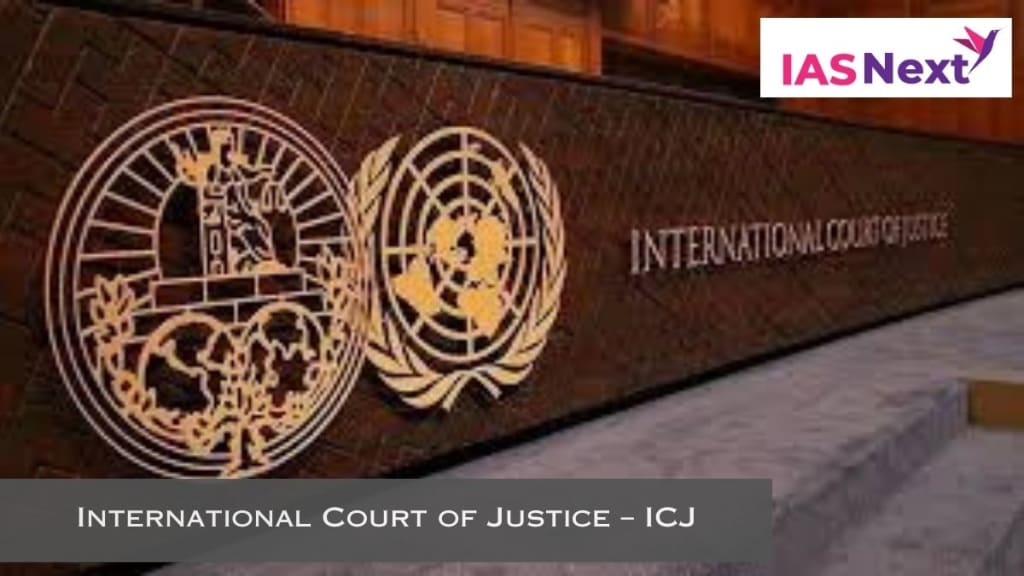International Court of Justice – ICJ
IAS NEXT is a topmost Coaching Institute offering guidance for Civil & Judicial services like UPSC, State PCS, PCS-J exams since more than 10 years.

Introduction and Historical Perspective of ICJ
International Court of justice – ICJ is a principal organ under International law, created to resolve the disputes between the states. It bears a great responsibility in resolving International disputes. International Court of Justice is the successor of Permanent Court of Justice.
The idea to create an International court to deal with International dispute first arose during the Hague Convention. After the First World War and creation of League of Nation, the idea was converted into reality and Permanent Court of International justice was established. The court came into operation in 1922.
The purpose to create International court was to settle the disputes between states and to establish peace globally. When there is a dispute between two nations, the difficulty arises with regards to the jurisdiction. To resolve this issue, the international court was established.
Permanent Court of International justice ceased functioning in the Second World War from the year 1940. There were some limitations in PCIJ, so it was dissolved in 1940. During the San Francisco Conference, a discussion was made where the members felt a need of International Tribunal to resolve international disputes. It was decided to create International Court of Justice in the place of Permanent Court of Justice. ICJ came into operation in 1945.
Composition of International Court of Justice
The International court of justice is composed of 15 judges and not more than one judge shall be elected from one state. The judges are elected for a period of nine years. The judges represent the legal system of the world.
Judges should be a person of high moral standard and should possess the qualification that is required in their respective countries for the appointment of highest judicial offices or jurisconsults of recognized competence in International Law. During the term of office, no judges should engage in any political or administrative functions or any other occupation of professional nature.
The President and Vice President of the court are elected by the court for a term of three years. The court is assisted by a Registry and headed by a Registrar. Elections are held in every three years for five vacancies. Election is held simultaneously both in General Assembly and in the Security Council. Voting in each is done independently. In order to get elected, candidate must obtain majority of votes from each forum.
The court can also establish chambers composed of three or more judges. Such Chambers were constituted upon the request of the parties. The court can also establish a special chamber for environmental matters. A judgment given by a chamber is considered as a judgment of the Court.
The statute provides that where there is a judge of the nationality of one of the parties is sitting on the bench, and then in order to maintain equality, the opposing party may choose an Ad hoc judge of his nationality. Each of the party may choose such a judge of their respective nationality if both of them do not have its national judge sitting on the bench. The judges so chosen have the same rights and duties as the members of the court during the proceeding.
Jurisdiction of ICJ
The International Court of Justice possesses two kinds of jurisdiction.
- Contentious Jurisdiction
- Advisory Jurisdiction
Contentious Jurisdiction
It provides that the court can decide the case with the consent of both the parties. Court cannot initiate any proceeding merely because one party has filed a case. The consent of both the parties is required to initiate a proceeding.
Contentious Jurisdiction is classified into three categories.
- Voluntary Jurisdiction
- Ad hoc Jurisdiction
- Compulsory jurisdiction
Voluntary Jurisdiction is that jurisdiction where the parties by virtue of an agreement or treaty between them decided that if any dispute arises, it should be referred to the Court for settlement......Read more
Read Also : Means For The Settlement Of International Disputes
About the Creator
Enjoyed the story? Support the Creator.
Subscribe for free to receive all their stories in your feed. You could also pledge your support or give them a one-off tip, letting them know you appreciate their work.





Comments
There are no comments for this story
Be the first to respond and start the conversation.